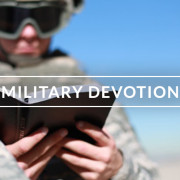The House of Bread – August 25, 2023
Your people will be my people and your God my God. Where you die I will die, and there I will be buried.
Ruth 1:16,17
Devotion based on Ruth 1:16,17
See series: Military Devotions
As we turn the pages of Holy Writ past the turbulent and bloody times covered in the book of Judges, our attention is directed to a small town that had been known as Ephratha. It became better known as Bethlehem—which translated, is, the House of Bread.
Ironically, the day came when the House of Bread ran out of bread. There was a famine in the land.
At that point, our attention is drawn to a woman named Naomi. With her husband and two sons, she moved to the land of Moab to escape the famine. The Moabites, we may recall, had been the ancient enemies of Israel. Naomi and her family would find food in Moab, but they would live there as strangers in a strange land.
Yet, her sons found wives among the Moabites. One of them was named Orpah and the other Ruth.
Sadness clouded Naomi’s life when her husband died in that foreign land. The grief multiplied when both of her sons also died. Not surprisingly, she decided to go back to Bethlehem, which no longer suffered from famine.
But what about her daughters-in-law? Their family and friends were in Moab. They knew no one in Bethlehem. Worse, they would have expected to be treated as unwelcome immigrants from a country hostile to Israel.
Moab was the land of the dreaded Philistines. Yet, it wasn’t just their nationality that would offend Naomi’s friends and family. The religion of Moab was the despised worship of the heathen idol, Dagon. The Israelites would have remembered when the Philistines defeated their army in a battle that killed the sons of their high priest—and then dragged the holy ark of the covenant into the temple of Dagon as an offering to him.
That’s why the words of Ruth to Naomi are so striking. She refused Naomi’s invitation to remain with her people in Moab. Instead, she told her mother-in-law, “Your people will be my people and your God my God. Where you die I will die, and there I will be buried.”
And it was so! But there is much more to the story. And her story flows into our story.
Naomi returned to Bethlehem as a widow with a widowed daughter-in-law—and no means of self-support. But by the law of God, help for such people was available. When crops were harvested, the owner was not allowed to go back to get what was missed in the field. That was to be left for the poor people to gather.
That’s why Ruth was found working in the field owned by a man named Boaz. He was a distant relative of Naomi. Again, by the law of God, a man who died childless could have his line continued if his widow married a relative of his who was willing to give up his own claim to descendants. His children would be considered the dead man’s legacy.
Ruth was a poor Moabitess. Boaz was a prosperous landowner from a prestigious Israeli line. Not only did they fall in love—they were definitely meant for each other! The book of Ruth is a true love story. But why is it included in the inspired text of the Word of God?
Because it is a love story showing the love of God for us!
Ruth and Boaz gave Naomi a grandchild. We hear, “Then Naomi took the child, laid him in her lap and cared for him. The women living there said, ‘Naomi has a son.’ And they named him Obed.” Then comes the shocker. “He was the father of Jesse, the father of David” (Ruth 4:16,17).
King David’s grandmother was a Moabitess. Bethlehem became known as the City of David a thousand years before Jesus was born. In the prophecy later quoted to the wise men, Micah had written,
“But you, Bethlehem Ephrathah,
though you are small among the clans of Judah,
out of you will come for me
one who will be ruler over Israel,
whose origins are from of old,
from ancient times” (Micah 5:2).
Bethlehem, the House of Bread, site of the grave of Rachel, Jacob’s wife; home to Boaz and his wife, Ruth; birthplace of Jesse and his son, David, is also the birthplace of Jesus, the Son of God and Savior—who told us, “I am the bread of life” (John 6:48).
There’s a lesson to be learned from this. In a prophetic vision, Saint John saw those who were celebrating victory in heaven by singing,
“Great and marvelous are your deeds, Lord God Almighty.
Just and true are your ways, King of the ages” (Revelation 15:3).
Never should we doubt what he promised! Ever should we count on his marvelous ways!
Only from him comes the Bread of Life.
Prayer:
Guide me, O thou great Jehovah, pilgrim through this barren land.
I am weak but thou art mighty, hold me with thy powerful hand.
Bread of heaven, feed me till I want no more. Amen.
(Christian Worship 93 331:1)
Points to ponder:
- What does it mean for us that someone in the bloodline of Jesus was not a Jew?
- How do we know that Naomi was not afraid to live her faith among non-believers?
- What is the significance of Ruth’s words, “And there I shall be buried”?
Written and recorded by Rev. Paul Horn, WELS National Civilian Chaplain to the Military, San Diego, California.
All Scripture quotations, unless otherwise indicated, are taken from the Holy Bible, New International Version®, NIV®. Copyright ©1973, 1978, 1984, 2011 by Biblica, Inc.™ Used by permission of Zondervan. All rights reserved worldwide. Note: Scripture reading footnotes are clickable only in the web version.


